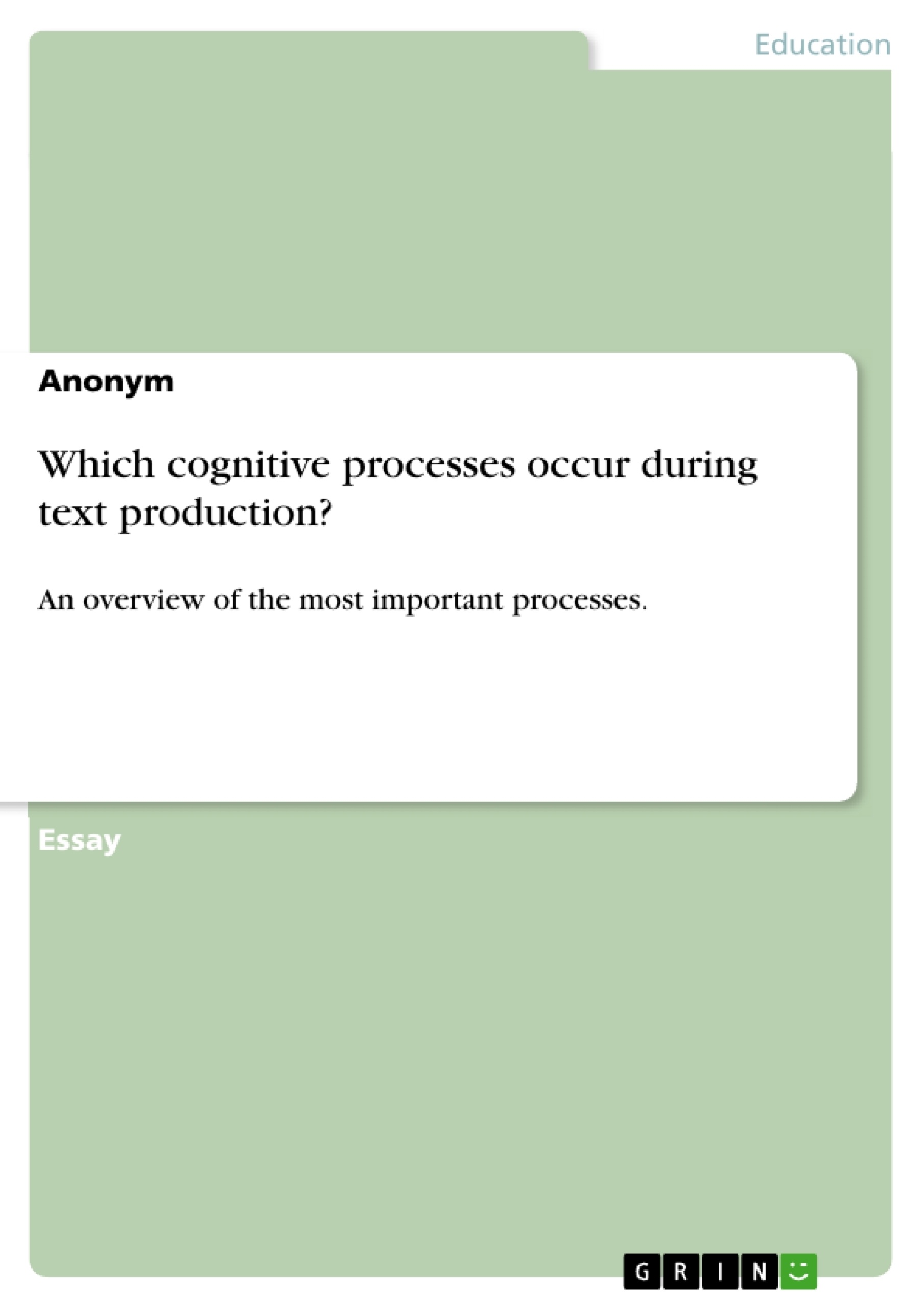The aim of this work is to clarify what kind of challenges arises for language producers when expressing complex language units, beyond word- and sentence planning. Questions like which cognitive processes take place in the planning of text production? or which aspects play a role when it comes to target audience or coherence? are trying to be answer in this essay. In this context, there is no distinction between written or orally produced texts.
First of all, I would like to introduce a common language user model from a psycholinguistic point of view. Subsequently, the three basic cognitive processes of speech production: focusing, selection/linearization and encoding, are going to be analyzed more closely. Based on this, I will briefly focus on two descriptive models of cognitive aspects of text production, the description model by Kintsch and the Story-Grammar model by Rummelhart. Finally, I will shortly highlight influential model of writing and written text production in contemporary writing research and their strengths and shortcomings. These models influence writing research methodologies “and therefore specific conceptualizations of writing as an object of inquiry”. Hereupon, follows my conclusion, or rather summary, and my references.
Inhaltsverzeichnis (Table of Contents)
- 1. Introduction
- 2. Psycholinguistic aspects of speech production
- 2.1 Description model by Kintsch
- 2.2 Story-Grammar model by Rummelhart
- 3. Stages of text production
- 3.1 Focus
- 3.2 Selection and linearization
- 3.3 Encoding
- 4. Writing Models
- 4.1 What is a model?
- 4.2 Text-oriented Model
- 4.3 Didactic process model
- 4.4 (Socio) cognitive models
- 5. Conclusion
- References
Zielsetzung und Themenschwerpunkte (Objectives and Key Themes)
This work aims to explore the challenges faced by language producers when creating complex linguistic units, beyond word and sentence level. It delves into the cognitive processes involved in planning text production, considering aspects such as target audience and coherence. This essay examines the production of both written and spoken texts.
- Cognitive processes involved in planning text production
- Challenges of expressing complex language units beyond the sentence level
- The role of target audience and coherence in text production
- Descriptive models of text production
- Influential models of writing and written text production
Zusammenfassung der Kapitel (Chapter Summaries)
- Introduction: This chapter introduces the psycholinguistic approach to text analysis and highlights the importance of considering the speaker as a language planner and producer. It emphasizes the lack of comprehensive models for the entire text production process and states the objective of this work: to understand the cognitive processes involved in text production.
- Psycholinguistic aspects of speech production: This chapter introduces the language user model, which describes the cognitive processes involved in both language production and reception. It highlights the language processing modules involved in speech production, including the conceptual system, the grammatical coding system, the phonological coding system, and the articulator. The chapter also discusses the roles of long-term memory and short-term memory in language production.
- Description model by Kintsch: This chapter explores Kintsch's description model of text production, which focuses on the propositional depth structure of texts. It examines the concept of propositions as the semantic units of text and explains how structural coherence is achieved through the overlapping of arguments in successive propositions. The chapter also discusses research findings on the relationship between the number of propositions in a text and reading speed as well as memory performance.
- Story-Grammar model by Rummelhart: This chapter delves into the Story-Grammar model of Rummelhart, which is based on observations of long-term memory retention. It explains Bartlett's memory theory and highlights the role of schematic knowledge in text comprehension and recall.
Schlüsselwörter (Keywords)
The main focus of this work is on the cognitive processes involved in text production, with particular emphasis on the planning and production of complex linguistic units. Key themes include the language user model, the role of memory, the description model by Kintsch, the Story-Grammar model by Rummelhart, and influential models of writing and written text production.
Frequently Asked Questions
What are the main stages of text production?
The three basic cognitive processes are focusing (conceptualization), selection/linearization (choosing and ordering information), and encoding (linguistic formulation).
What is Kintsch's description model?
Kintsch focuses on the propositional depth structure of texts, analyzing how semantic units (propositions) overlap to create structural coherence.
What does Rummelhart's Story-Grammar model explain?
It describes how we use schematic knowledge stored in long-term memory to comprehend, structure, and recall narrative texts.
How does memory influence text production?
Long-term memory provides world knowledge and linguistic rules, while short-term (working) memory handles the active planning and processing of the text currently being produced.
Is there a difference between oral and written text production?
While the basic cognitive processes are similar, writing allows for more revision and complex structuring, whereas oral production requires faster, real-time processing.
- Citation du texte
- Anonym (Auteur), 2018, Which cognitive processes occur during text production?, Munich, GRIN Verlag, https://www.grin.com/document/489448



